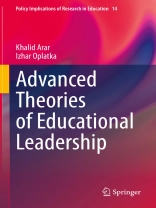Advanced Theories of Educational Leadership presents recent models of leadership and analyzes their components and implications in the educational context. Each chapter features the scholarly background of each model, its components, antecedents, and critically analyzes its values and application to educational institutions. Special attention is given to issues of social justice, equity, equality, anti-racism, and the like. This core text provides aspiring school leaders and administrators with each model theory, and tools for applying it with special attention to issues of social justice, equity, diversity, and anti-racism alike. The book designed in a form of a course textbook for postgraduate students in the field of Educational Leadership and Administration in studying each model. Also, it provides professors of educational leadership in teaching contents and methods in their courses about
school leadership, school improvement, Educational Leadership Development, Superintendents’ Qualification; School Leadership Professional Development, every chapter includes teaching tools, reflection questions and practice activities for students, in addition the book informs researchers, and policymakers aiming at promoting multi-faceted educational leadership for equity and excellence and robust models of leading, improving and changing schools.
Tabla de materias
Introduction.- 1. The current scholarship about educational leadership.-
Part I. The importance of system and context. – 2. Strategic Leadership.- 3. Responsible leadership.- 4. Community engaged leadership.- 5. Culturally Responsive Leadership.-
Part II. Relational processes in leadership. – 6. Servant Leadership.- 7. Ethical Leadership.- 8. Narcissistic leadership.-
Part III. Influence relationships. – 9. Authentic leadership.- 10. Spiritual leadership.- 11. Positive Leadership.-
Part IV. Concluding comments. – 12. Conclusions and implications.
Sobre el autor
Khalid Arar, Ph.D. is a Professor of Educational Leadership and Higher Education at the School Improvement Doctoral Program, College of Education, Texas State University and an Associate Editor of the International Journal of Leadership in Education and Middle-East regional editor of Journal of Education Administration and History. For the past two decades, he conducted studies in the Middle East, Europe, North America and the USA on the issues of equity, diversity and social justice in K-12 and higher education. His recent books include: Migrants, Refugees and Global Challenges in Higher Education (Peter Lang Publishing, with Kussai Haj-Yehia, David Ross, & Yasar Kondakci); Education, Immigration and Migration: Policy, Leadership and Praxis for a Changing World (Emerald Publishing, with Jeffrey Brooks & Ira Bogotch); School Leadership for Refugees’ Education (Routledge), and his most recent co-authored book is Higher Education in the Eraof Migration, Displacement and Internationalization (Routledge).
Contact: Prof. Khalid Arar, Texas State University 601 University Drive, San Marcos, TX 78666, email: [email protected]
Izhar Oplatka is a professor of Educational Administration and Leadership at The School of Education, Tel Aviv University, Israel. Prof. Oplatka’s research focuses on the lives and career of school teachers and educational leaders, educational marketing, emotions, and the foundations of educational administration as a field of study. His most recent books include Reforming Education in Developing Countries (2019, Routledge), Emotion Management in Teaching and Educational Leadership: A Cultural Perspective (with Arar, EMERALD Publishing Limited), Project Management in Schools (2018, with Yemini and Sagi, Palgrave-Macmillan), Higher Education Consumer Choice (2015, with Jane Hemsley-Brown, Palgrave), The legacy of educational administration: A historical analysis of an academic field (2010, Peter Lang Publishing), The essentials of educational administration (2015, Pardes Publisher, in Hebrew), Organizational Citizenship Behavior in Schools (2015, Routledge, with Anit Somech).












